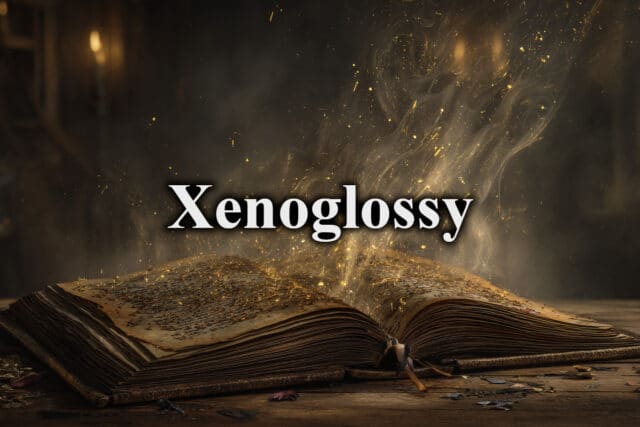Xenoglossy is the purported paranormal ability to speak, write, or understand a foreign language that has not been previously learned through conventional means. The term derives from the Greek words xenos (foreign) and glossa (tongue or language), literally meaning “foreign tongue.”
Definition and Types
Xenoglossy is distinguished from glossolalia (speaking in tongues) in that it involves claims of using actual human languages rather than non-linguistic vocalizations. Researchers have identified two primary categories:
Recitative Xenoglossy: The automatic, rote expression of words or phrases in a foreign language without interactive communication ability. Subjects may repeat memorized-sounding phrases but cannot engage in conversation.
Responsive Xenoglossy: The ability to communicate intelligibly and interactively in a foreign language, including understanding questions and providing appropriate responses. This form is considered more compelling evidence by proponents.
Passive Xenoglossy: A subtler manifestation involving regional dialects or unusually rapid acquisition of native languages beyond normal developmental expectations.
Historical Context
The concept of xenoglossy has appeared throughout history in religious and spiritual contexts. Early documentation includes:
- Biblical accounts of the Day of Pentecost, where apostles allegedly spoke in foreign languages
- Medieval reports of saints and mystics displaying linguistic abilities
- 19th and 20th-century spiritualist claims during séances and mediumship
The term was first formally introduced by researcher Charles Richet in 1906 during his investigations into psychical phenomena.
Scientific Investigation
University of Virginia Research
The most systematic study of xenoglossy was conducted by the University of Virginia’s Division of Perceptual Studies. Researchers documented cases within their database of children claiming past-life memories:
- 41 documented cases between 1959-2020 initially coded as xenoglossy
- 40 verified cases after manual review of investigation files
- Cases often involved children allegedly speaking languages connected to claimed previous personalities
Notable documented cases include:
- Uttara Huddar: An Indian woman who allegedly spoke Bengali during personality changes, despite purportedly not knowing the language
- Burmese twins: Two girls who reportedly communicated in Japanese as children, claiming memories of being Japanese soldiers
Research Findings
A 2025 study analyzing the University of Virginia database found xenoglossy cases were significantly associated with:
- Higher emotional content during memory recall
- Violent or traumatic alleged past-life deaths
- Strong desires to return to claimed previous families
- Cases rated as more evidentially compelling
Skeptical Explanations
Critics propose several conventional explanations for apparent xenoglossy:
Cryptomnesia: Forgotten exposure to foreign languages later manifesting as seemingly spontaneous knowledge
Misidentification: Made-up sounds or gibberish mistaken for actual languages
Fraud: Deliberate deception for attention or other motives
Pareidolia: Pattern recognition causing observers to hear familiar language structures in random vocalizations
Dissociative States: Psychological conditions creating altered consciousness that may affect speech patterns
Scientific Criticism
Linguistic researchers have questioned xenoglossy claims on several grounds:
- Lack of rigorous linguistic analysis in many reported cases
- Absence of controlled testing environments
- Difficulty distinguishing between genuine language use and memorized phrases
- Limited documentation of grammatical competency
The phenomenon remains highly controversial within the scientific community, with most researchers attributing reported cases to conventional psychological or linguistic explanations.
Cultural and Religious Significance
Xenoglossy holds particular significance in:
Reincarnation Research: Cases often involve children claiming memories of past lives in different cultures
Religious Contexts: Various faiths interpret xenoglossy as evidence of divine inspiration or spiritual possession
Parapsychology: Researchers consider it potential evidence for survival of consciousness or anomalous information transfer
Current Status
While anecdotal reports continue, xenoglossy remains scientifically unproven. Modern researchers emphasize the need for:
- Real-time linguistic verification
- Controlled testing environments
- Separation of legitimate linguistic ability from memorized phrases
- Rigorous documentation of cases
The phenomenon continues to be studied within broader investigations of consciousness, memory, and alleged paranormal abilities.
Related Phenomena
- Glossolalia – Speaking in tongues (non-linguistic)
- Cryptomnesia – Forgotten memories re-emerging as new experiences
- Past-life memories – Claims of remembering previous incarnations
- Possession states – Altered consciousness attributed to spiritual entities

